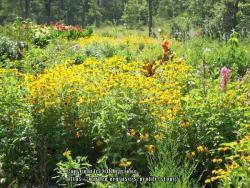Per the Flora of North America
Rudbeckia hirta can be annuals, biennials, or perennials
R. hirta var. angustifolia and var. floridana - annuals, biennials, or perennials
var. hirta - biennials, or perennials
var. pulcherrima – annuals or perennials
I believe this is because of the way these plants respond to their various natural habitats. Of the Rudbeckia I’ve grown most behave both as short lived perennials and annuals. Noting them as
perennial and
suitable as an annual seems appropriate. What do you think
@KentPfeiffer ?
